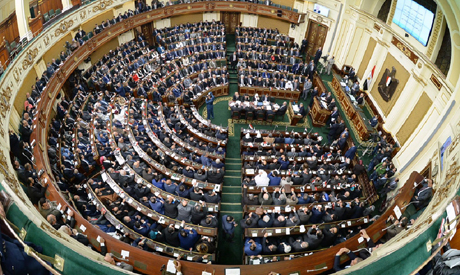
Egyptian Parliament, Photo taken January 10, 2016. (AFP)
A decree issued by President Abdel-Fatah El-Sisi 2 January extending Egypt's nationwide state of emergency for further three months will be discussed and voted on in parliament Monday.
The decree authorises the army and police to undertake all necessary procedures to combat terrorism and preserve the safety of citizens and public properties across the nation.
The decree (No 647/2017) states that "the state of emergency will be imposed for a further three months due to the country's dangerous security conditions."
Article 2 of the decree states that under the state of emergency the army and police will be required to take all the measures necessary to thwart terrorist attacks, block terrorist funding, preserve security and public properties and keep citizens safe.
Article 5 states that the decree will go into effect only after two thirds of MPs approve it in a plenary session. It will go into effect at 1am 13 January.
Article 4 states that in accordance with emergency law (No162/1958) all powers granted to the president will be used by the cabinet to implement the new extension of the state of emergency and send those who might violate the law to prison.
The state of emergency was first imposed in April 2017 after two church bombings killed 47 people. It was then extended in July for another three months.
A new decree was issued last October, re-declaring the imposition of the state of emergency for a new period of three months.
According the Egyptian constitution, a state of emergency cannot exceed six months from its date of declaration and decrees imposing or extending it should be approved by parliament.
Parliament's legislative and constitutional affairs committee will meet Monday morning to discuss El-Sisi's decree and prepare a report on it to be discussed during the House's plenary session. Informed sources said Prime Minister Sherif Ismail or Acting Prime Minister Mostafa Madbouli will come to parliament to address MPs on the reasons behind the new extension.
Many MPs said they will vote in favour of the new extension. Mostafa El-Guindi, an independent MP, told Ahram Online that, "The state of emergency remains an effective tool in thwarting terrorist attacks and punishing terrorists."
"Although Egypt was able to fight different waves of terrorist attacks, the country still has a long way to go to fully ridding itself of terrorism," said El-Guindi.
Samir Ghattas, another independent MP, told Ahram Online that, "The re-imposition of the state of emergency does not mean that Egypt has not yet become safe, or that the country is still a fertile ground for terrorists and terrorist attacks."
"This is not correct because Egypt's security conditions have largely improved thanks to emergency law and other factors," said Ghattas, citing the resumption of direct flights between Egypt and Russia and a surge in foreign tourist traffic as clear signals that Egypt has become largely safe.
Mostafa Bakri, another independent MP, also told Ahram Online that, "Egypt is still facing the danger of terrorist groups targeting Christians and places of worship."
"Most of these groups, particularly the ones targeting the army and police forces in North Sinai, still receive funding and media coverage from hostile countries like Qatar and Turkey," said Bakri, adding: "The state of emergency and military trials have proved effective tools in preventing terrorist crimes." "In the first half of the 1990s, the state of emergency was a big success in saving the country from different waves of terrorism," said Bakri.
Bahaaeddin Abu Shoqa, head of parliament's legislative and constitutional affairs committee, told reporters that "the committee's report on the new extension will show whether it was used to detain critics or harass the media and the press."
"What we saw in past months was that the government invoked emergency powers primarily to clamp down on terrorists," said Abu Shoqa.
Short link: